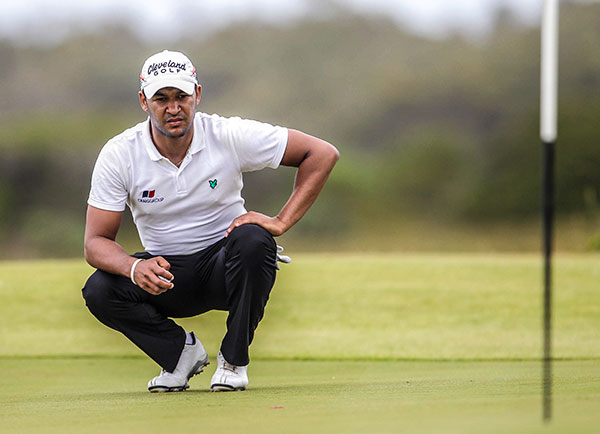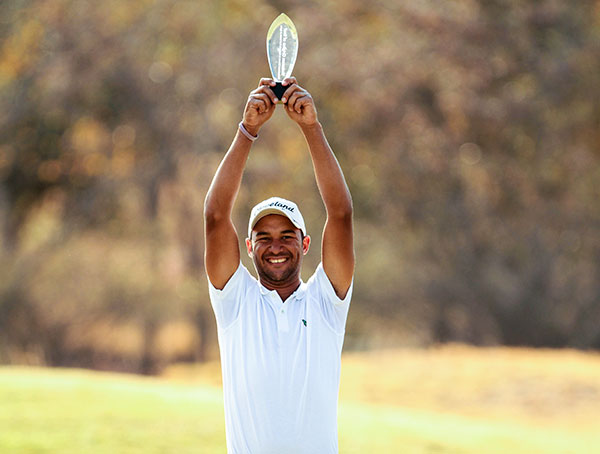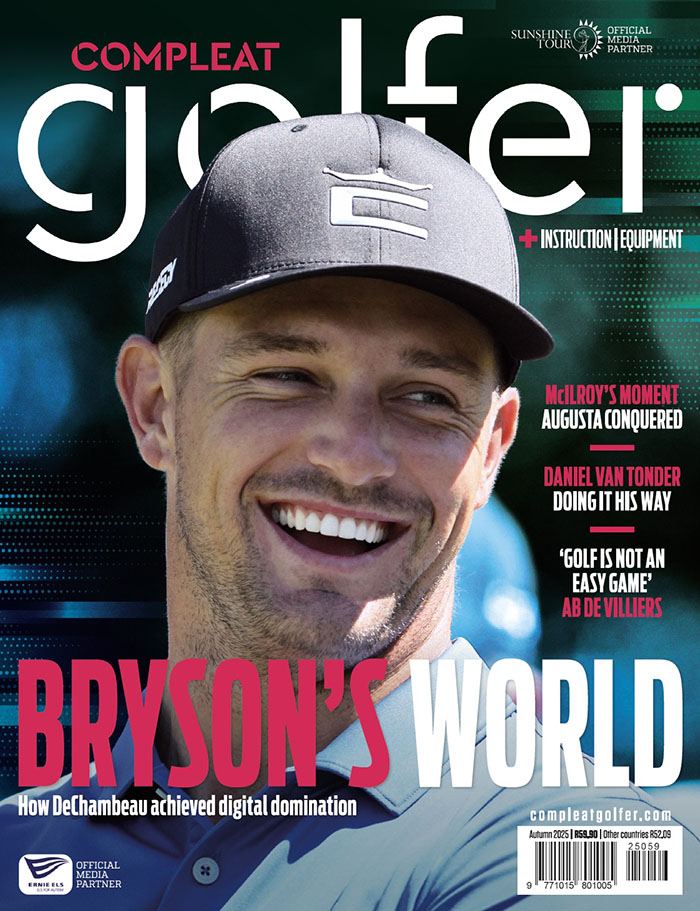What do Ben Hogan, Bobby Locke and Heinrich Bruiners all have in common?
They’ve all been involved in life-threatening car accidents. All three have overcome this adversity to continue playing the game they love. Locke was never the same after his accident, but Hogan and Bruiners used their near-death experiences to achieve even greater things.
Bruiners’ accident occurred in 2010 and it put him out of action for two years. Prior to this, he had already shown his incredible talent in a multitude of sports, most of all chess and table tennis. It is clear, however, that since that fateful day that could have ended his sporting career, the 28-year-old gained a new perspective on life, and has since become an even better golfer than he was as a promising junior.
We caught up with Bruiners, fresh off a tie for second in an IGT Pro Tour event in Cape Town, to discuss his career and ambitions.
Compleat Golfer: Congratulations on another strong finish in the IGT Pro Tour event at Durbanville. How has that tour helped your game?
Heinrich Bruiners: Thank you. The weather wasn’t great but I played really well and my golf is getting there. I always intended to play a couple of IGT events this year just to stay competitive and keep those competitive juices flowing. I’ve played all five events in the Cape and it really feels quite similar to playing in full tournaments. It’s not exactly the same, but it helps to feel that pressure while playing. It has also given me the chance to test a few things I’ve been working on. I’ve just changed from a long putter to a short one and since switching, I’ve shot my lowest round this year, so that’s encouraging.
CG: We’ve read that you were talented at almost all sports growing up, especially table tennis. How did you get into golf and why did you eventually choose it as your preferred career?
HB: I played tennis, cricket, baseball, and I was selected for South West Districts for almost every sport I played. I participated in five or six different sports for SWD and I was selected to play for South Africa in both chess and table tennis, but then it conflicted with golf. I was turning 16 at that time and my father told me that I had to make a decision on which sport I would like to play and take it to a professional level, so it was obviously getting a bit much.
The opportunities in golf are much better because it is an individual sport and you aren’t as dependent on other people and how they play. When I played table tennis and many other sports, politics was quite a big thing and you would also find that the son of the father who managed the team would always be selected first. But in golf, if you played well there was obviously no politics or interference to stop you from making the team. It was only the score that mattered and if you were shooting low scores, you were eventually going to win the event. So I chose golf because I felt like I had the opportunity to be great at it.
CG: Was it at age 16 that you decided you would eventually turn professional?
HB: It was at that point that I started believing that I could turn professional.
I was doubting golf because it is obviously an expensive sport, but I was fortunate because I was part of the Ernie Els & Fancourt Foundation, which started out as just the Fancourt Foundation, and it funded all my golfing needs from when I was about 13 years old. And things went well and I went on to be selected for the South African team. But when I was 16 and going into Grade 11, I had to make the decision on what I wanted out of golf and I chose to concentrate on turning professional.
CG: Tell us about the car accident you had? When was it, what happened and how long did it take you to recover?
HB: It happened in 2010 and I was man down for quite some time. I broke my femur and I literally had to learn how to walk again. They had to put a steel pin into my right leg and it took six months for me to be able to walk again. I had to try to find a job and get back into training so I worked for SwingFit as the head coach for a year at Pezula.
That helped me stay in the game and after that I tried to start my own academy, but I struggled to find a place where I felt like I could do it. I decided then to give golf one more go. I was still limping at the time but after a session with Roger Wessels at the KeNako Academy in George he saw that I still had a desire to play professionally. In 2012 I got back into training properly and played in all of the PGA pro-ams. It took a lot of hard work and dedication and I managed to play in a few events on the Sunshine Tour in 2012.
CG: Did the accident change your perspective on playing golf? You seem to have had better results since the accident.
HB: It definitely did. When I started out as a professional golfer everyone said I was talented. I thought so too, but talent isn’t enough. I honestly believe that the harder you work, the luckier you get, but back then I took my ability for granted and I just felt like everything was going to happen on its own, mostly because I was selected for all of the provincial and national teams and everything just came my way without me really putting much effort in.
After the accident, though, I really appreciated all of the small things. Being able to walk again. Being able to go to gym. It was about four months after the accident that I was really happy when I was first able to stand and go to the bathroom to brush my teeth and I used to do that with the biggest smile on my face. It really became a special thing to me to be able to go and brush my teeth without any assistance every day. That really helped me a lot. Getting back into the professional side of golf was a rough road.
I missed a whole bunch of cuts in 2013, and after that I finished in the top 10 in a Big Easy event and things got better from there.
In 2013, Bruiners became a Sunshine Tour winner for the first time.
CG: Were you ever worried during that time that you would never play again?
HB: Absolutely. I was in tears for quite some time about it. When I was in the hospital the doctors told me there was a possibility that I would never be able to play golf again and I honestly didn’t know what to think or do after that. But while I was lying there I started thinking to myself: if there’s a will, there’s a way. I said that to myself every day over and over again, even while I was lying on my back. It took a lot for me to commit to playing golf again, but I felt – and still feel – like it was worth it. And I realised when everything was going badly that I had a passion for golf and that I really love what I do.
CG: Tell us about your first Sunshine Tour win in 2013. Did that victory at Euphoria change the way you approach tournaments?
HB: It definitely helped me a lot, but I also got complacent. It certainly taught me a lot about myself. After I won, my confidence was really high and I thought I had everything sorted out and knew what to do going forward, but I also don’t think I was training hard enough. I was just going with the flow after that win.
But knowing that I could win was a big boost for me. When you start believing that you can do something, it makes it a lot easier. One thing I have learnt this year is that it’s not about what you did in the past, but about what you are going to do in the next event.
It is always about that next event because if you win a tournament now, nobody will remember that in the next two weeks. It’s all forgotten. So I think that every day, and in every way, you should try to get better. I feel like I am close to winning another tournament thanks to this motto of trying to get better every day. Even if it is just one percent each day, it all adds up over time.
CG: 2014 has been your most successful year, despite not winning a tournament. Has not having to pre- qualify made it that much easier?
HB: My goals were really high in 2014 and I ended up having a really good season.
I only missed one cut during the first half of the year. I had many goals in 2014 and one was to finish in the top 50 on the Order of Merit and I really worked hard for that.
CG: And how have things been going so far this season?
HB: I unfortunately missed all of the cuts in the co-sanctioned events at the beginning of the year, but I have done well and played solidly in the last few events. My biggest mistake this year was working with my coach on making changes to my game to take it to the European Tour. I changed a few things in my swing and it wasn’t necessary. I just needed to improve on what I was already doing. Too many guys get so obsessed with having a good-looking swing and doing everything the right way and I was doing the same thing and moving in the wrong direction.
I realised this in Zimbabwe this year where I missed the cut. I was four shots within the cut line and I got to the 10th hole and hit one of the worst tee shots I have ever hit. From that point on I knew I was going to miss the cut. I also knew that what I was doing with my swing wasn’t going to help me in the long run, it was going to mess up my golfing career. I was actually thankful that I missed that cut because it made me go back to what I knew and to trust my abilities.
I’ve come such a long way and I know how to play golf, so to make 120 changes to my swing so that it looks more like how everyone says it should is nonsense.
Now I am moving in the right direction where I feel like I can compete again. The last few weeks I have really been playing nicely.
CG: You played a lot of golf with Branden Grace growing up in George. Tell us about that…
HB: Ja, we were foursomes partners and used to travel everywhere together. Between the ages of 15 and 18 we had a rivalry. We were very competitive and it’s what made both of us good golfers.
I remember playing in the EP Amateur one year and I was 8 under par on the final hole and had a putt for an eagle. Branden was also 8 under on the same hole and somehow hit this miraculous shot from behind branches in the rough to ‘gimme’ range and moved to 10 under. I ended up 9 under and lost by one. After he won that EP Amateur, he then won the SA Amateur and just pushed on from there.
CG: Has his sudden success surprised you, or did many, including you, see it happening from a young age?
HB: Not at all. Branden has always been able to use his nerves in the correct way, to his advantage. He hits the ball the same distance as most of the other guys we grew up with, but he channels his energy the right way when necessary. He hits it much further when under pressure, whereas certain people hit it shorter. He can handle his nerves really well. I didn’t think he would win six European Tour events in such a short time, but I always knew he would get to the European Tour. I played with a lot of the guys doing well now, like George Coetzee and Branden, and it is always nice to see them doing well. It is encouraging for me, because I feel like if I can just start believing, then I can get to that level too.
CG: What are your plans? You said that you want to be the best in the world. Are you going to try to get a playing card on any one of the other tours around
the world?
HB: Everybody on tour wants to be the best in the world. Obviously if you don’t have that ambition then you are wasting your time. For next year I want to make sure I am exempt on the Sunshine Tour first and foremost. Then, if possible, I want to try and finish in the top 25 on the Order of Merit to get into the second stage of the European Tour qualifying school. Then obviously I want to try to get my European or Challenge Tour card. I haven’t looked much into the Asian or Challenge tours. I have always looked at the European or US Tour. I love watching the US Tour and even if I could get onto the Web.com Tour to start, that would be great. But I want to try to make sure I get onto the European Tour as my first goal, and if not, then I am going to try to go to the Web.com Tour.
You can follow Heinrich @Heinrich1.









